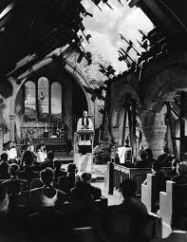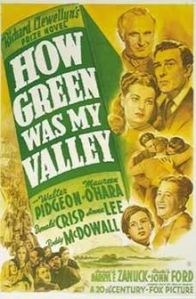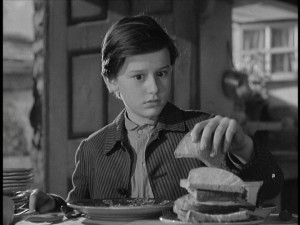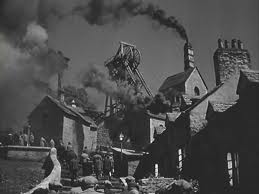-“If war comes, it’s goodbye roses.
-“Don’t talk silly. Ha! You might as well say goodbye England. There’ll always be roses.”
-Foley and Mr. Ballard, Mrs. Miniver
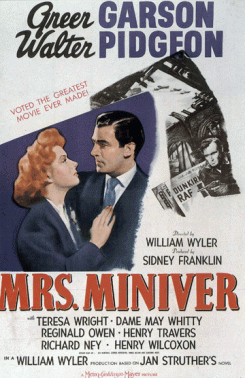 By 1942, America had joined the World War II, and Hollywood was quick to follow suit. World War II casts overt tones over the next three best pictures and none more so than Mrs. Miniver, an unabashed propaganda piece detailing the struggles of war-torn England. Filming for the movie began before the U.S. entered into the war and it was initially designed to be an anti-isolation movie. By the time the movie was released, the U.S. was in the thick of it, only adding to the urgency of the film’s message.
By 1942, America had joined the World War II, and Hollywood was quick to follow suit. World War II casts overt tones over the next three best pictures and none more so than Mrs. Miniver, an unabashed propaganda piece detailing the struggles of war-torn England. Filming for the movie began before the U.S. entered into the war and it was initially designed to be an anti-isolation movie. By the time the movie was released, the U.S. was in the thick of it, only adding to the urgency of the film’s message.
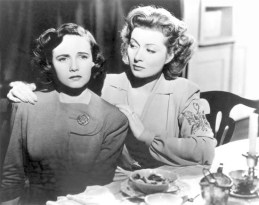
A pair of Oscar winners – Best Supporting Actress Teresa Wright as Carol Beldon and Best Actress Greer Garson as the titular Kay Miniver.
Based on a collection of British short stories, Mrs. Miniver details the cataclysmic shifts in life and culture brought about by England’s entrance and absorption into World War II. The movie begins in 1939, with a collection of stories straight out of the Adventures of Ozzie and Harriet: Kay Miniver (Best Actress Greer Garson), the middle class housewife and voice of reason in the town of Starlings, spends too much on a hat then harangues with her husband Clem (Walter Pidgeon) when he wants to buy a new car; later, her oldest son, Vin, returns home from college as a world-class a-hole, but softens when he becomes smitten with Carol (Best Supporting Actress Teresa Wright), the granddaughter of the town snob, the rich Lady Beldon (Vin particularly hates the aristocratic upper class).
The Minivers’ world is thrown into disarray when England enters the War. Vin joins the Royal Air Force, leading to many sleepless nights for his parents. Clem, who owns a small boat, is drafted into assisting with the evacuation at Dunkirk (look it up) leaving Mrs. Miniver to deal with a German pilot who crash-lands near the village. Interestingly, in many movies, the German would be sympathetic – a lost soul, scared, injured and alone and Mrs. Miniver would grow sympathetic to him. Instead, he is nothing short of a monster, explaining how England will be reduced to rubble by the Germans.
Things get even tenser once the village becomes the target of nightly German bombings. The movie does not pull any punches in showing the damage. The Minivers’ home – and much of the village – is basically destroyed as the bombings continue. But the town struggles on, continuing its daily life (and humorous anecdotes) culminating with a showdown at the annual flower show between Lady Beldon and the trainman over who has grown the best rose (it actually is a far more moving scene than what I have described). Following more tragedy, the film ends on a powerful note with a church service as the villagers gather to mourn the dead and find strength. The camera pans up to show the church itself is bombed out and in ruins. But the town will persevere.
I thought Mrs. Miniver was a very powerful movie and, as noted, derivated a lot from what you would expect. In some ways, its propaganda tone – England is good, Germany is bad – is pretty simplistic, especially for what we expect from a Best Picture winner, where “shades of grey” are the norm – check out All Quiet on the Western Front, for example, where we pity the soldiers. In Mrs. Miniver, we either love them (the English) or hate them (the German pilot). But on the other hand, the tonal shift from idyllic quaintness to harsh realities of life in war time on the front line is very moving. There are some schmaltzy scenes that can elicit an eye roll (like when Vin joins Lady Beldon in her private church pew) but there also some moments of real humanity.
The movie feels too long. After the suspense of Mrs. Miniver facing down the German spy, it feels like we should be winding down, but there’s still another 45 minutes to go (it’s a very long movie). Still, the movie is a really interesting piece of the cultural mindset as America entered the war.
Creepy Trivia: Garson, who wasn’t as old as the character she played, ended up marrying Richard Ney, who played her son Vin in the movie!
